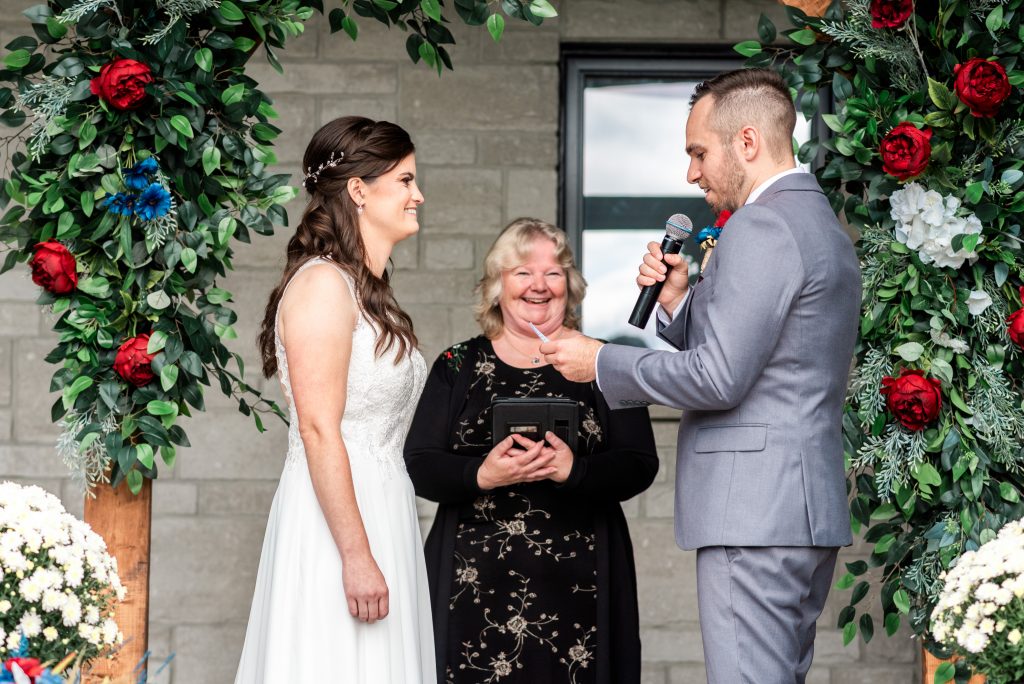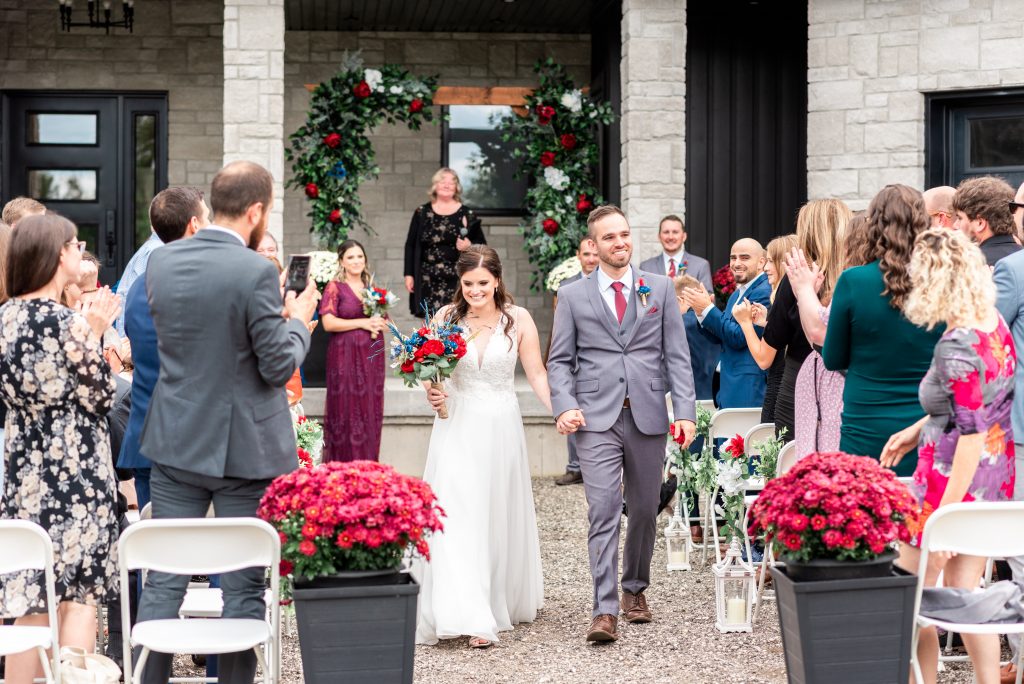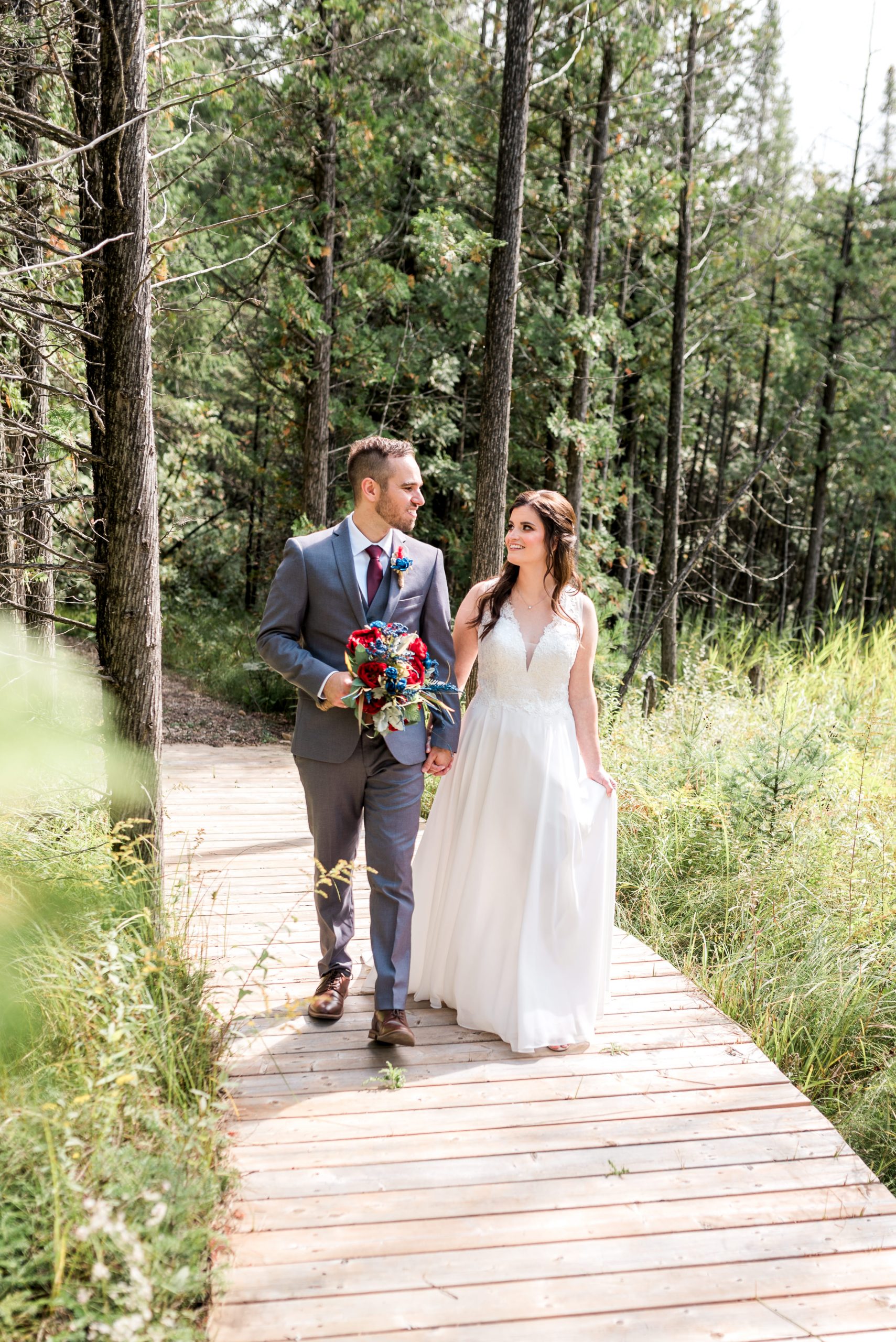WELLINGTON COUNTY – In a world where diversity is celebrated and traditions evolve, couples are increasingly choosing non-religious wedding officiants to lead them through one of life’s most significant milestones. The role of a wedding officiant has traditionally been associated with religious figures, but a growing number of couples are opting for a more personalized and secular approach to their wedding ceremonies.
Non-religious wedding officiants, often called celebrants or secular officiants, are stepping into this role with grace and inclusivity.
Michele Humphrey is one such officiant. When she was married in 2017, she and her husband struggled to find an officiant who matched their values and beliefs. They were looking for something simple that reflected their desire to be true to themselves, which in their case meant no religious affiliation.
“My previous career was in employment services, and I was always looking for opportunities. I heard that Humanist Canada was looking for officiant candidates, and my son encouraged me to pursue it,” Humphrey said.
“I joined Humanist Canada and a year later I attended training. By spring 2019, I became an officiant.”
Most of Humphrey’s ceremonies are outdoors, each taking on their own personality. Her motto is “we are flexible” as not everything always goes according to plan.
“Weddings are about joy. There is often laughter in my ceremonies, but it’s almost entirely unplanned,” she said.
One of the key advantages of choosing a non-religious wedding officiant is the freedom it provides in crafting a ceremony that truly reflects the couple’s individual love story without the constraints of religious doctrines.
Humphrey appreciates personalization and recognizes that every couple has a different journey. She strives to create ceremonies that authentically represent who they are and the love they share.
“I really let the couple lead the way. I provide a sample ceremony outline and then we work together to craft wording that reflects their values, hobbies, interests, family situation and any additional features they would like included,” she said.
Heather Napier and Paul Di Mari were married in September 2023.

Humphrey had come highly recommended by someone they’d met through the wedding industry. They were looking for someone who could deliver a non-religious, lighthearted ceremony.
“We wanted it to really feel like a celebration and a seamless unity of our two families,” Di Mari commented.
“It was important for Michele to not only be a good fit for us, but for us to be a good fit with her style of officiating. She certainly delivered and exceeded expectations.”
One of the defining features of non-religious ceremonies is their inclusivity. Celebrants often embrace diverse backgrounds, cultures, and lifestyles, fostering an atmosphere where everyone feels welcome. This openness allows couples to celebrate their love without excluding friends and family who may come from various religious or non-religious backgrounds.
“On our wedding day, we were able to be fully present, enjoy the moment, and celebrate the milestone with our family and friends,” Napier said.
“We had the opportunity to personalize our vows and Michele supported us through this process. She provided several sample vows that aligned with the environment we were hoping to create. We were then able to adapt some of the concepts and personalize it. Paul and I crafted our own separate vows which were the perfect mix of laughter and tears.”
Humphrey has performed ceremonies that incorporate cultural elements, remembrances, poetry, and music that are meaningful to the couples.
“It becomes about the couple, not the religious ritual. My weddings are beautiful and thoughtful,” she said.
“I believe that every ceremony needs an element of romance – even the elopements and legal ceremonies. The wording of the service reflects that. I am known for my laughter and every ceremony has a moment that can be covered or diverted with a small laugh and a smile.”
Despite the growing popularity, there is still some stigma associated with non-religious ceremonies, particularly from those who view weddings as intrinsically tied to religious rites. Non-religious officiants like Humphrey work diligently to dispel these misconceptions, emphasizing that a secular ceremony does not diminish the sanctity of the commitment being made.
“Some people are of the view that if religion is not involved then it isn’t a real wedding,” she suggested.
“It is very difficult to become an officiant in Ontario. Humanist officiants are licensed by the Province of Ontario and by Humanist Canada and undergo extensive training.”
Beyond the emotional and symbolic aspects, non-religious officiants are often recognized legally to solemnize marriages. Many jurisdictions now acknowledge the authority of celebrants, providing couples with a legal alternative to traditional religious ceremonies.
“It isn’t like on television where you go online and become an officiant in two hours. I am upfront with everyone who makes an inquiry that my services do not include any religion as I am not licensed to perform religious ceremonies.”
Humphrey went on to say, “in fact, my license would be revoked if I were to. I make sure that our expectations match before we proceed with creating a wedding ceremony together.”
Officiants like Humphrey are instrumental in crafting ceremonies that incorporate personalized rituals, making the wedding experience truly unique. Whether it’s planting a tree, exchanging meaningful objects, or creating custom vows, couples are finding ways to express their commitment in ways that go beyond traditional religious practices.
“There is no longer a ‘must-do’ in a wedding ceremony. It is about a couple,” she said.
“Humanist ceremonies are about the couples experiences and their life together. Whether it’s the pet who is part of the wedding party, the incorporation of Indigenous elements, or honouring a deceased parent through a moment of silence, each wedding is unique to the couple and filled with moments of joy and often tears.”

Napier highly recommended Sincere Life Services, saying that Humphrey created the perfect atmosphere for her wedding and set the tone for the celebration.
“Michele had a great sense of humour and was more solemn when the moment called for it,” she said.
“She is professional, attentive, and responsive but most of all, she is an incredible and down to earth person. From day one she provided her expertise and thoughtfully guided us through the ceremony process. She took all the stress out of the ceremony and made us feel relaxed and excited.”
While the demand for non-religious officiants is on the rise, there are challenges that come with breaking away from longstanding traditions.
Humphrey reflected on these challenges, referencing a service where the groom wanted to honour his Jewish heritage with the Seven Blessings.
“We worked together to keep the sentiment behind the reading without using religious words. As long as I can be respectful of the tradition and not violate my code of ethics, cultural elements can be incorporated into services with some creativity,” she said.
Napier and Di Mari’s wedding serves as testament to Humphrey’s care and dedication.
“Michele not only made a lasting impression on us, but also our guests. We had several comments on the day of how great the ceremony was and the celebratory feel of the day. It really set the tone for the evening,” Di Mari said.
As the wedding landscape continues to evolve, the role of non-religious officiants is becoming increasingly vital.
These celebrants bring a fresh perspective to wedding ceremonies, offering couples the opportunity to celebrate their love authentically. As more couples seek personalization and inclusivity in their ceremonies, the rise of non-religious officiants is poised to become a lasting trend, reshaping the way couples say “I do” in the 21st century.




